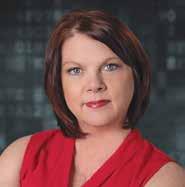
4 minute read
Editor's Corner: Finding Comfort and Courage in Our Shared Identity
As I stepped out of my office at Shalom Park to attend our community’s Yom Ha'Zikaron observance, the site of increased police presence, metal detectors, and bags being searched at the entrance to the building stopped me in my tracks. The solemn day to honor Israel's fallen soldiers and victims of terrorism had been on my mind, but for a moment, I had forgotten the harsh realities that prompt these security measures.
This juxtaposition — security intended to protect us but simultaneously highlighting our vulnerability — captures the paradox we live with today. We live in a time when the Jewish community must balance the comfort of communal gatherings with the sobering reality of potential threats. While the presence of security is meant to make us feel safe, it can also serve as a stark reminder of the dangers we face.
Despite these challenges, one of the most striking aspects of this year's observances and celebrations — the first since October 7, was the number of people who still showed up. Even with the heightened risk, the undeniable increase in antisemitism, and the tensions from strengthening pro-Palestinian protests, our community still comes together in significant numbers. This commitment to our traditions and to each other demonstrates our resolve to stand together despite the threats we face.
I recalled the record-breaking turnout at last year’s rally to Washington, D.C — almost 300,000. It's not that people aren’t afraid or that these issues aren't on their minds, but they seem to take a backset to something more important. While it’s uncertain how many might stay home due to fear, the large groups of people that continue to come together reflect a powerful sense of solidarity.
How do we reconcile these feelings? How do we find peace in knowing that while we are protected, the need for such protection exists? It's a delicate balance between living our lives fully and acknowledging the vulnerabilities that come with our identity.
As I looked past the sharp edges of the metal detectors to the softer warmth of the gathering of my friends, I realized that our strength and safety as a community don’t lie solely in the physical measures we take to protect ourselves. It lies in our unity, in our ability to come together in the face of adversity, and in our unwavering commitment to our values and traditions.
The heightened security at our events is a testament to the challenges we face, but it also underscores our resilience. We gather, we remember, we celebrate, and we move forward— together. This unity is our greatest security.
For the second year in a row, Jewish Federation of Greater Charlotte hosted visiting Israeli soldiers through the Jewish Agency for Israel program, “Soldiers in Uniform.” From our Yom HaZikaron observance through our Yom Ha’atzmaut celebrations, they got to know our Charlotte community and we had the opportunity to hear from them about their experiences and perspectives. They presented to groups of children and adults and had countless one-on-one conversations.
During one such conversation with them in which I mentioned my initial my reaction to the police presence and metal detectors, one of them asked me what I thought about it. The conversation stuck with me, so later that day, I went back to them and asked them what they thought about it. Jewish Agency for Israel (JAFI) representative and reserve soldier, Netanel had these words to share:
“While discussing security issues, we differentiate between actual security and the sense of security. We look for balance to reach the maximum level of both. Of course security is important, but we also need to feel safe and comfortable. Since October 7 both security and the sense of security have been affected. Many of us don’t feel safe to walk around showing our Jewish identity. It’s scary. But then another emotion rises. We sometimes feel a need to show our Jewish identity out and proud. How do these two feelings work together? I think after all that happened it’s only natural that we connect in a stronger way to our Jewish identity. By doing so we take ownership over it. Instead of letting the antisemites decide who is Jewish and what defines us Jews, we step up and tell them otherwise. Only we will define what it means to be Jewish. Only we know how beautiful our values are. Only we appreciate to such an extent our rich history and all our people have gone through. That is what gives us strength to stand up through these difficult days. To stand up and together get through this. Because now more than ever we understand that if we hide our Jewish identity, we lose a big part of who we are. And it would be such a shame to give up on such a beautiful part of who we are.”










